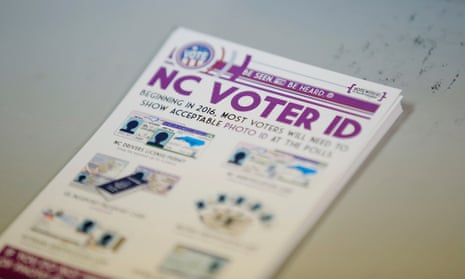A federal court on Friday struck down North Carolina voting laws it said were enacted with “discriminatory intent”, targeting African Americans “with almost surgical precision”.
Plaintiffs in the suit welcomed what one called “a stinging rebuke” to the Republican-controlled state government, representatives of which questioned the political affiliations of the judges involved and said they would appeal the decision to the US supreme court, because it “ignores legal precedent”.
They added: “We can only wonder if the intent is to reopen the door for voter fraud, potentially allowing fellow Democrat politicians like Hillary Clinton … to steal the election.”
The ruling was a sweeping victory for voting rights activists and the US justice department, which argued that black voters were disenfranchised by laws that, among other things, required voters to show photo ID at polling stations and banned early voting.
A three-judge panel of the fourth circuit court of appeals reversed a lower court’s decision, writing in a stinging opinion that the district court “fundamentally erred” in its decision to uphold the state’s 2013 voter ID law.
“We can only conclude that the North Carolina general assembly enacted the challenged provisions of the law with discriminatory intent,” wrote circuit judge Diana Gribbon Motz in the majority opinion.
The ruling could have a significant impact on the 2016 election – 14 other states enacted voter ID laws after the June 2013 supreme court decision in Shelby v Holder, which overturned parts of the Voting Rights Act. North Carolina introduced its voting restrictions immediately after Shelby v Holder, leading numerous organizations and individuals to file suit.
Many such suits were consolidated in the case eventually brought before the fourth circuit. Plaintiffs included the US justice department, the North Carolina chapter of the National Association for the Advancement of Colored People (NAACP), the League of Women Voters and the American Civil Liberties Union (ACLU), which argued that the voting laws discriminated against black voters.
“This ruling is a stinging rebuke of the state’s attempt to undermine African American voter participation, which had surged over the last decade,” Dale Ho, director of the ACLU’s Voting Rights Project, said in a statement. “It is a major victory for North Carolina voters and for voting rights.”
When the 2013 restrictions were put in place, African American registration and turnout in North Carolina had nearly reached parity with white voting rates.
If the laws were to stand, citizens taking part in the 2016 elections would have to provide photo ID at polling stations, could not pre-register to vote, would not be able to participate in early voting and could not register to vote on the same day as an election. Lawmakers who supported the restrictions said they were meant to prevent voter fraud.
The federal court opinion said the new laws introduced voting mechanisms that African Americans disproportionately lacked, like photo IDs, and took away voting methods African Americans disproportionately used, like pre-registration. They also, the opinion said, provided remedies for problems that did not exist.
According to the opinion, lower courts also failed to account for the country’s history of instituting discriminatory voting laws as an electoral strategy.
“The record makes clear that the historical origin of the challenged provisions in this statute is not the innocuous back-and-forth of routine partisan struggle that the state suggests and that the district court accepted,” Motz wrote.
“Rather, the general assembly enacted them in the immediate aftermath of unprecedented African American voter participation in a state with a troubled racial history and racially polarized voting.”
The US attorney general, Loretta Lynch, applauded the ruling. Such voting restrictions, she said in a statement, “sent a message that contradicted some of the most basic principles of our democracy”.
She added: “The ability of Americans to have a voice in the direction of their country – to have a fair and free opportunity to help write the story of this nation – is fundamental to who we are and who we aspire to be.”
On Friday afternoon, the North Carolina house speaker, Tim Moore, and senate president pro tem, Phil Berger, released a joint statement.
It said: “Since today’s decision by three partisan Democrats ignores legal precedent, ignores the fact that other federal courts have used North Carolina’s law as a model and ignores the fact that a majority of other states have similar protections in place, we can only wonder if the intent is to reopen the door for voter fraud, potentially allowing fellow Democrat politicians like Hillary Clinton and Roy Cooper to steal the election.”

Comments (…)
Sign in or create your Guardian account to join the discussion